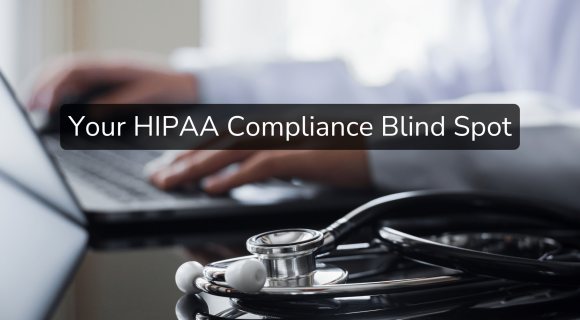Your medical practice is likely patient-centered and your team works diligently to provide quality care. Nowadays it’s not so easy, with compliance hurdles, cyber threats and mountains and mountains of paperwork at every turn. You know you need HIPAA compliance and perhaps you already employ a team to help you with that. You check all the boxes of policies and technical safeguards. You’re feeling great. But… there is compliance blind spot looming. While you might have purchased a security awareness training module for your team, do you know if they’re actually using it?
Despite the best efforts in adopting advanced security technologies and crafting detailed policies, the lack of comprehensive training for all levels of staff poses a serious vulnerability. It threatens the integrity of patient data and the organization’s compliance with HIPAA standards. Recognizing and addressing this oversight is essential for fortifying healthcare entities against potential breaches and violations.
The Role of Security Awareness Training in HIPAA Compliance
Staff training is the linchpin that connects the dots between theoretical policies and their practical application in day-to-day operations. Without a well-informed team, the most sophisticated policies and advanced technologies fall short, as it is the staff who interact with patient data, manage its storage, and ensure its confidentiality and security in real-world scenarios.
Training equips them with the necessary understanding to navigate the complexities of HIPAA compliance, empowering them to make informed decisions and take appropriate actions that uphold the law and protect patient information. Beyond mere compliance, effective staff training fosters a culture of privacy and security, making it a fundamental aspect of a small medical practice.
The need for comprehensive staff training becomes even more critical when considering the diversity of roles within a healthcare setting. From administrative personnel to medical professionals, each member of the organization plays a unique role that interacts with patient information differently. Each role requires tailored training that addresses specific responsibilities and challenges in HIPAA compliance.
For instance, medical staff need to understand the nuances of sharing patient information for care coordination, while IT personnel must be adept at implementing and managing security measures. This diversity underscores the importance of a customized training approach that considers the varied interactions with patient data, ensuring that every member of the organization is equipped with the knowledge and tools to contribute positively to HIPAA compliance.
Untrained staff can inadvertently cause data breaches, as over 90% of all breaches involve human error. Whether through phishing scams, improper data handling, or unauthorized disclosures, there are many ways that the people behind the company can cause a breach and risk a HIPAA violation.
The Consequences of Inadequate Training
It’s easy to think, “It won’t happen to me.” But let’s look at the numbers. Over the last five years, there have been 17 reported healthcare-related breaches involving Rhode Island-based organizations. Over 80,000 people have been affected by these breaches. Taking steps to mitigate a breach can have starting costs in the tens of thousands. And if you don’t have the policies and technologies in place, you may not get relief from your cyber liability insurance. That means the starting costs to handle a breach could come from your own coffers.
For example, in 2019 a behavioral health provider in Maryland experienced a breach affecting 14,000 patients. The practice was unable to provide the evidence to the Department of Health and Human Services (HHS) Office for Civil Rights (OCR) that showed sufficient security measures were implemented to help avoid the cyber incident in question. The behavioral health provider settled the case for $40,000 and was forced to implement a corrective action plan that included, among several other measures, better HIPAA compliance staff training.
Another significant example involves Memorial Healthcare System (MHS), which in 2017 agreed to pay one of the largest settlements at the time, $5.5 million, for potential HIPAA violations. The breach, affecting 115,143 individuals, was due to staff members inappropriately accessing patient information. The OCR’s investigation found that MHS had not regularly reviewed logs that showed who accessed ePHI, highlighting a failure in training staff on the importance of monitoring and controlling access to sensitive patient information.
Identifying the Blind Spot
Small medical practices frequently overlook security awareness training, creating a significant blind spot in their security framework. This oversight stems from a pervasive but mistaken belief that establishing comprehensive policies and deploying cutting-edge security technologies are sufficient to safeguard patient health information. However, without the necessary emphasis on educating the workforce, these measures only address part of the compliance equation.
The reality is that the effectiveness of any privacy and security policy hinges on the staff’s understanding and adherence to these guidelines. Technology can only do so much to prevent breaches; it’s the human element that often determines the strength of an organization’s compliance posture. As a result, neglecting to provide regular and role-specific training for all members of the organization not only undermines the potential of the existing security measures but also exposes healthcare providers to avoidable risks and vulnerabilities.
One way to identify the blind spot before it severely impacts your organization is to get regular updates on the participation and success rates of your security awareness programs. This may require working with your managers, human resources team member, and your IT team. Ensuring that all members of your organization are taking their annual security awareness training, without exception, is a great start. Checking in on the ongoing weekly micro-training and course correcting with specific employees before it becomes a major problem is another supporting measure to help ensure compliance and avoid a breach.
What Can You Do to Close the Gap?
In light of the crucial role that thorough security awareness training plays in achieving and maintaining HIPAA compliance, we strongly encourage healthcare organizations to take a moment to review and assess the effectiveness of their current training programs. If you find gaps or areas for improvement, or if you’re unsure where to begin, seeking expert assistance can significantly enhance your compliance posture and safeguard against potential vulnerabilities.
At Remi IT Solutions, we specialize in providing comprehensive HIPAA compliance solutions related to IT, including tailored staff training programs designed to meet the unique needs of your organization. Don’t let inadequate security awareness training be the weak link in your compliance efforts. Contact us today at 401-240-1000 for a consultation, and take the first step towards a stronger, more secure future for your organization and the patients you serve.

